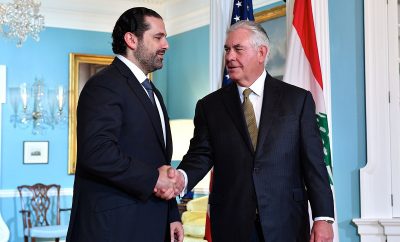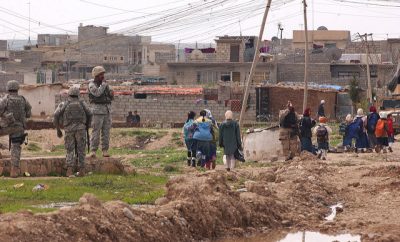 "Temple of Zeus" Courtesy of [David Stanley via Flickr]
"Temple of Zeus" Courtesy of [David Stanley via Flickr]
World
With a Fresh Round of Airstrikes, U.S. Joins Fight Against ISIS in Libya
Monday marked a new collaborative effort between the U.S. and Libya aimed at debilitating the Islamic State in its last stronghold in Libya, the port city of Sirte. Responding to requests from the U.N.-backed Libyan government, the U.S. began precise airstrikes against the Islamic State, also known as ISIS or ISIL, targets–namely tanks and other vehicles. Fayez Serraj, the head of Libya’s presidency council, the central government cobbled together and recognized by the U.N. last December, said ISIS experienced “major casualties” as a result of the U.S. effort. Monday’s strikes are the first by U.S. forces since February, and the third overall since ISIS planted its roots in the North African country in 2014.
A statement by Pentagon Press Secretary Peter Cook postured the “precision airstrikes” as a supportive effort aimed at bolstering Libyan forces while erasing the lingering ISIS presence in Sirte, a Mediterranean port city that serves as the group’s operational hub in North Africa. “The U.S. stands with the international community in supporting the GNA as it strives to restore stability and security to Libya,” the statement read, citing the Libyan Government of National Accord, or GNA, which arose out of a power struggle that broke out in Libya in 2014. “These actions and those we have taken previously will help deny ISIL a safe haven in Libya from which it could attack the United States and our allies.”
While the exact number of ISIS fighters remaining in Libya is unknown, officials estimate that a 6,000 strong force as of just a few months ago is steadily dropping. A few hundred are thought to be left in Sirte, a city that an ISIS force of 1,500 once held and ruled under its strict interpretation of Islamic law. U.S. support will not be limited to airstrikes–intelligence and surveillance will also be provided, officials said–but will not extend to boots on the ground. “This is the time for the international community to live up to its promises to the Libyan people,” Serraj, who is effectively Libya’s prime minister, said.
Officials briefed on the details of the U.S. plan–approved by President Obama after recommendations from Defense Secretary Ash Carter and Chairman of the Joint Chiefs of Staff Gen. Joseph Dunford–said the strikes will last for at least a few weeks, or as long as Libyan forces require assistance. ISIS has faced territorial losses over the past year, but its influence continues to terrify the globe, as its members or followers have killed scores of innocent people. The group’s terror does not discriminate between hemispheres, as targets in the east–Baghdad, Iraq and Bangladesh–and west–Nice, France and Orlando–have been hit in recent months.
Swaths of its territory has been retaken by government forces in Iraq in recent months, but Sirte remains one of ISIS’ last redoubts. In 2011, Libya was liberated from its dictator, Moammar Gadhafi, who was killed during the so-called Arab Spring, a protest movement that swept through the region. A power vacuum fractured the country into tribal and ethnic factions, allowing militant groups like ISIS to flourish. GNA, the U.N.-backed government formed in late 2015. Whatever ISIS’ precise number of soldiers left in Libya is, Dunford, one of the two men who recommended the airstrikes to Obama, said the group has “suffered significant casualties.” He added: “I don’t think there is any doubt that the Islamic State in Libya is weaker than it was some months ago.”








Comments